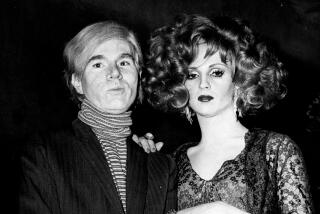Sweet tooth for a harmful sort of candy
- Share via
“Candy” is a love story about a boy, a girl and a drug. The boy is Dan (Heath Ledger), a poet and dedicated addict, the girl is Candy (Abbie Cornish), a young painter just starting out as a user, and the drug is heroin, which has cracked tougher nuts than these two in half the time. All stories about addiction amount to remakes, essentially, and “Candy,” for all its sunlit surface freshness, is no exception, though it does offer the novel cinematic perspective that (quick, cover the kids’ eyes) drugs are fun until they’re not.
Based on a novel by Luke Davies, who co-wrote the screenplay with director Neil Armfield, “Candy” is divided into three sections titled “Heaven,” “Earth” and “Hell,” and it takes us through the stages less dutifully than the cascading titles would imply. Much of the credit for this goes to Ledger and Cornish, whose low-key but emotional performances lend sweetness to the otherwise sordid series of events. Ledger, in particular, exerts a sideways pull as the loving but toxic lost boy who lures Candy away from her safe but stifling milieu. In a couple of scenes when they eat, or try to, with Candy’s concerned parents, they are reminiscent of a cleaned-up, super-foxy Sid and Nancy, though their angelic mugs withstand the ravages of long-term drug use and prostitution amazingly well.
There’s no lead-up to their spiral; when we first see them, Dan and Candy are in love and using, and the first section of the movie is an outlaw druggie love and amateur crime romp. It’s no “Drugstore Cowboy,” however. The notion that Candy’s nagging mom and somewhat doltish dad drove her to it is floated halfheartedly, but ultimately, and probably more realistically, their drug addiction is presented as just something that happened.
Geoffrey Rush has a flamboyant role as Casper, a junkie chemistry professor who plays Dr. Leary to their latter-day flower children. He offers the movie’s message upfront, when they come to him for money early on. “When you can quit, you don’t want to. When you want to quit, you can’t.”
Ultimately, “Candy” is little more than a linear, sympathetic chronicle of needle-induced damage, which is perhaps unintentionally mitigated by the fact that the kids are so pretty and their amour is so fou it takes a truly horrifying childbirth scene for the decadent thrill to wear off.
Still, for a druggie movie, “Candy” is surprisingly dynamic and involving, and Armfield refrains from moralizing to closely observe the parallels between different forms of intoxication. Hovering on the sidelines of the genre, it declines to turn the grind of addiction into a grim metaphor for life and settles for telling an intimate story about a marriage felled by an insidious force.
*
MPAA rating: R for drug use and sexuality. Running time: 1 hour, 48 minutes. At Laemmle’s Sunset 5, 8000 Sunset Blvd., West Hollywood, (323) 848-3500; Regal/Edwards University Town Center 6, 4245 Campus Drive, Irvine, (949) 854-8818.
More to Read
Only good movies
Get the Indie Focus newsletter, Mark Olsen's weekly guide to the world of cinema.
You may occasionally receive promotional content from the Los Angeles Times.










